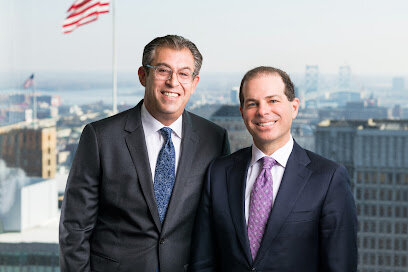Best Insurance Fraud Lawyers in Philadelphia
Share your needs with us, get contacted by law firms.
Free. Takes 2 min.
List of the best lawyers in Philadelphia, United States
About Insurance Fraud Law in Philadelphia, United States
Insurance fraud covers a wide range of dishonest acts intended to obtain money or other benefits from an insurance company by deception. In Philadelphia, as elsewhere in Pennsylvania, insurance fraud can be treated as a criminal offense, a civil matter, or both. Common examples include staged auto accidents, false injury claims, workers compensation fraud, arson for proceeds, false property-damage claims, premium-evasion schemes, agent or provider fraud, and misrepresentation on insurance applications.
Pennsylvania law targets intentional deception in insurance transactions. Prosecutors and civil plaintiffs must generally prove that the person acted knowingly or purposely to misrepresent facts with the goal of obtaining an improper insurance benefit. Penalties may include fines, restitution, probation, loss of professional licenses, and jail or prison time depending on the severity and monetary amount involved. Both state and local authorities investigate and prosecute insurance fraud, and private insurers frequently bring civil suits to recover payments or cancel policies.
Why You May Need a Lawyer
Insurance fraud matters can escalate quickly and have long-term consequences for work, finances, and freedom. You may need a lawyer if you are:
- Accused of making a false insurance claim, whether by your insurance company, a prosecutor, or another party.
- Contacted by law enforcement or prosecutors about an investigation into an accident, arson, staged claim, or workers compensation matter.
- A medical provider, contractor, or insurance agent facing allegations of billing fraud, kickbacks, or forged records.
- Sued by an insurer in civil court to recover allegedly fraudulent payments or to rescind a policy.
- A victim of insurance fraud who needs help reporting the crime, preserving evidence, or pursuing civil remedies.
Criminal defenses require legal strategy around intent, mistakes, and evidentiary issues. Civil cases raise separate questions about contract interpretation, damages, and equitable remedies. An attorney experienced in insurance-fraud defense or prosecution will evaluate evidence, protect your rights during interviews, negotiate with prosecutors or insurers, and represent you in court or administrative proceedings.
Local Laws Overview
Key legal aspects to understand in Philadelphia and Pennsylvania generally include:
- Criminal Statutes: Pennsylvania criminal law addresses insurance fraud and related offenses. A central criminal statute makes it illegal to knowingly present false information to obtain insurance proceeds. Penalties vary with the monetary loss and can be misdemeanors or felonies. Other criminal statutes that commonly intersect with insurance fraud include arson, theft by deception, perjury, and forgery.
- Civil Liability: Insurers can sue to recover improper payments, seek rescission of policies based on material misrepresentations, and pursue damages for bad-faith misrepresentation in some situations. Civil suits may seek restitution, punitive damages in limited circumstances, and attorneys fees if statutory conditions are met.
- Administrative and Professional Sanctions: Licensed professionals such as insurance agents, medical providers, and contractors may face disciplinary proceedings with state licensing boards or the state insurance regulator. Discipline can include fines, suspension or revocation of licenses, and mandatory restitution.
- Local Enforcement and Prosecution: In Philadelphia, investigations may involve the Philadelphia Police Department, the Philadelphia District Attorney’s Office, the Pennsylvania Office of Attorney General, and state regulatory investigators. Insurance companies and private investigators also frequently conduct parallel inquiries.
- Burden of Proof and Intent: Criminal convictions require proof beyond a reasonable doubt that the defendant knowingly sought to defraud the insurer. Civil actions require a lower standard of proof, typically a preponderance of the evidence. Demonstrating intent is often the central issue in defense or prosecution.
- Statute of Limitations: Time limits differ for criminal and civil claims. Criminal charges must be brought within statutory deadlines that depend on the offense class. Civil claims for breach of contract or fraud follow Pennsylvania civil statute-of-limitations rules. Timely legal advice is important to preserve defenses and claims.
Frequently Asked Questions
What exactly counts as insurance fraud in Philadelphia?
Insurance fraud includes any intentional misrepresentation or omission designed to obtain money or other benefits from an insurer. Examples include exaggerating injuries, staging accidents, submitting fake invoices, filing duplicate claims, lying on an application about prior losses or driving history, and intentionally setting fire to property to collect proceeds.
What are the typical criminal penalties for insurance fraud?
Penalties depend on the value of the claimed loss and the specific statutes charged. Consequences can range from fines and restitution to probation and imprisonment for felony-level offenses. Collateral consequences may include criminal records, loss of professional licenses, and civil liability to repay insurers.
Can an honest mistake be treated as insurance fraud?
No. Intent to deceive is a key element in most insurance-fraud prosecutions. Honest mistakes, clerical errors, or misunderstandings are not usually criminal if there was no knowledge or purpose to deceive. However, a civil dispute over policy coverage or a contested claim can still arise, and repeated inaccuracies could trigger investigation.
Should I talk to my insurance company or investigators without a lawyer?
Be cautious. Insurers and investigators may record statements or use information to deny claims or pursue criminal charges. If you are merely reporting a claim, provide accurate basic facts but avoid detailed, recorded statements until you know whether you are a target of investigation. If you have been contacted about possible fraud, consult a lawyer before giving detailed statements.
What happens if my insurer denies my claim as fraudulent?
An insurer may deny payment, cancel or rescind a policy, and seek recovery of amounts already paid. You may face civil litigation from the insurer. If the insurer alleges criminal fraud, you also could be investigated or prosecuted. You should consult both civil and criminal counsel if an insurer asserts fraud.
Can I be charged with insurance fraud if someone else staged an accident and named me?
If someone else implicates you, investigators will look at the evidence. Being named alone does not prove guilt. You should preserve evidence, document your whereabouts, and retain an attorney immediately if you are implicated or interviewed by police or prosecutors.
Will a conviction affect my professional license or employment?
Yes. Certain convictions, especially those involving dishonesty or theft, can trigger disciplinary action by licensing boards or employers. Professionals in regulated fields such as medicine, law, insurance, and construction are particularly vulnerable to license suspension or revocation after fraud convictions.
How do criminal and civil cases interact in insurance fraud matters?
They can proceed independently. A criminal indictment does not automatically bar a civil suit and vice versa. Prosecutors may wait for civil discovery or insurer investigations before charging, and insurers may use civil litigation to recover losses even where no criminal charges are filed. Coordination between criminal defense and civil counsel is often necessary.
What defenses are commonly used against insurance fraud charges?
Common defenses include lack of intent, mistake or negligence rather than knowing deception, insufficient evidence, identity misidentification, lack of materiality, and constitutional challenges to the evidence collection. The right defense depends on the facts and the documentary and testimonial evidence.
How do I find a lawyer experienced in insurance fraud in Philadelphia?
Look for criminal defense attorneys and civil litigators who handle insurance-fraud cases, have courtroom experience, and understand both state criminal statutes and insurance law. Ask about trial experience, outcomes in similar cases, fee structure, and whether they coordinate criminal and civil strategies. Local bar referral services, consultations with multiple lawyers, and client reviews can help you choose the right attorney.
Additional Resources
When dealing with suspected or alleged insurance fraud, the following types of organizations and offices can help or investigate complaints:
- Local law enforcement such as the Philadelphia Police Department for immediate incidents.
- Philadelphia District Attorney’s Office for local criminal prosecution matters.
- Pennsylvania Office of Attorney General for statewide investigations and specialized fraud units.
- Pennsylvania Department of Insurance or state insurance regulator for complaints about insurers, agents, and licensing issues.
- National Insurance Crime Bureau and similar industry organizations that collect fraud reports and intelligence.
- Professional licensing boards for providers and agents, such as medical, contracting, or insurance licensing authorities.
- Legal aid organizations and local bar associations for referral to attorneys experienced in criminal and insurance defense.
- Private investigators and forensic accountants retained by counsel in complex civil or criminal insurance-fraud matters.
Next Steps
If you suspect you are under investigation or have been accused of insurance fraud, act promptly:
- Do not destroy documents, delete messages, or alter records. Preserving evidence is crucial for your defense.
- Avoid giving detailed recorded statements to insurers, investigators, or others until you have legal advice.
- Document everything related to the claim or incident. Keep copies of medical records, repair estimates, receipts, communications, and policy documents.
- Contact a lawyer who handles insurance-fraud cases in Philadelphia. Ask about their experience with both criminal defense and civil litigation so they can coordinate strategy.
- If you are a victim of fraud, report the matter to your insurer, local police, and relevant regulatory bodies. Consider retaining counsel to help pursue civil recovery.
- If you cannot afford a private attorney and face criminal charges, advise the court immediately so you can explore public defender eligibility or pro bono resources.
Insurance fraud allegations require timely, informed responses. A qualified attorney can protect your rights, evaluate potential defenses, negotiate with prosecutors or insurers, and guide you through criminal, civil, and administrative processes.
Lawzana helps you find the best lawyers and law firms in Philadelphia through a curated and pre-screened list of qualified legal professionals. Our platform offers rankings and detailed profiles of attorneys and law firms, allowing you to compare based on practice areas, including Insurance Fraud, experience, and client feedback.
Each profile includes a description of the firm's areas of practice, client reviews, team members and partners, year of establishment, spoken languages, office locations, contact information, social media presence, and any published articles or resources. Most firms on our platform speak English and are experienced in both local and international legal matters.
Get a quote from top-rated law firms in Philadelphia, United States — quickly, securely, and without unnecessary hassle.
Disclaimer:
The information provided on this page is for general informational purposes only and does not constitute legal advice. While we strive to ensure the accuracy and relevance of the content, legal information may change over time, and interpretations of the law can vary. You should always consult with a qualified legal professional for advice specific to your situation.
We disclaim all liability for actions taken or not taken based on the content of this page. If you believe any information is incorrect or outdated, please contact us, and we will review and update it where appropriate.










